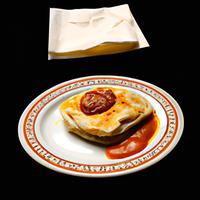
1 serving (30 grams) contains 80 calories, 2.5 grams of protein, 1.0 grams of fat, and 15.0 grams of carbohydrates.

Log this food in SnapCalorie

Nutrition Information
Calories |
640.0 | ||
|---|---|---|---|
% Daily Value* |
|||
| Total Fat | 8.0 g | 10% | |
| Saturated Fat | 1.6 g | 8% | |
| Polyunsaturated Fat | 0 g | ||
| Cholesterol | 0 mg | 0% | |
| Sodium | 400.0 mg | 17% | |
| Total Carbohydrates | 120 g | 43% | |
| Dietary Fiber | 12 g | 42% | |
| Sugars | 4.0 g | ||
| protein | 20.0 g | 40% | |
| Vitamin D | 0 mcg | 0% | |
| Calcium | 80.0 mg | 6% | |
| Iron | 4.0 mg | 22% | |
| Potassium | 320.0 mg | 6% | |
* Percent Daily Values are based on a 2,000 calorie diet. Your daily values may be higher or lower depending on your calorie needs.
Food Attributes
Source of Calories
About One small roti
One small roti is a versatile, round, unleavened flatbread originating from the Indian subcontinent, widely enjoyed in South Asian cuisine. Made primarily from whole wheat flour, water, and a pinch of salt, it is cooked on a hot griddle known as a tawa. This simple preparation makes roti a staple accompaniment to curries, vegetables, and lentils. Nutritionally, roti is rich in complex carbohydrates, providing sustained energy, and contains dietary fiber that supports digestion. It’s a moderate source of essential minerals like iron and magnesium, while being naturally low in fat. However, the healthiness of roti can vary depending on preparation methods; adding excessive butter, oil, or ghee during cooking or serving may increase calories and saturated fat. Small rotis are typically portion-controlled, offering a balanced addition to meals when consumed alongside nutrient-rich dishes. Their simplicity and wholesome ingredients make them a cherished component of many balanced diets.



